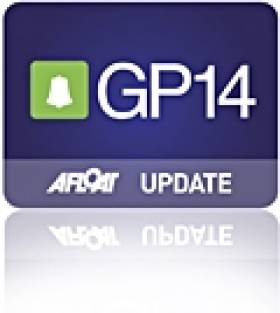Displaying items by tag: Nigel Kearney
Corcoran and Brogan Best of Irish at GP14 Nationals
Newtownards Sailing Club hosted this year's GP 14 Championship of Ireland. The event attracted 46 boats from throughout Ireland and Great Britain. Race Officer Nigel Kearney set excellent courses in what was some of the most testing conditions in recent years.
Form race one the weather conditions were steadily worsening; average wind speeds were in excess of 20 mph with gusts to 25 mph and occasionally 30 mph. The dark heavy sky laden with squalls added to the drama. As the fleet got underway, boats capsized on and after the starting. The strong wind made tactics of less importance than just sheer boat handling.
Rarely, for the GP fleet, many competitors opted not to fly the spinnaker on the downwind legs and those that did ran the risk of a capsize especially at the gybe mark which got very congested with upturned boats. The windward legs sapped the energy of helm and crew. The race was won by Tim Corcoran from Sligo.
Race two and the weather seemed to deteriorate further. Adding to the problem was the sea state - in an unusual swell for the North end of Strangford Lough and after the gruelling first race gave the competitors even more to contend with. Winner of the second race was Carl Jeffs from Trimley Sailing Club. The second day's sailing was cancelled due even stronger winds.
As a total contrast day three was glorious sunshine but light winds. Tactics came into play here and the English pairing of Andy Tunnicliffe and Chris Robinson reigned supreme, winning both races to give them the Championship overall.
Results: 1st Andy Tunnicliffe and Chris Robinson RWYC; 2nd and top Irish boat Tim Corcoran and Brendan Brogan, SYC; 3rd Carl Jeffs and Steve Parker TSC.
1st Silver Fleet: Cathal Sheriadan and David Cook, Skerries SC; 2nd Lawrence Baalham and Tony Brown, Newtownards Sailing Club 3rd G O'Sullivan and H McNally
1st Bronze Fleet: Maurice Baalham and Gary Brown, Newtownards Sailing Club; 2nd Bill Johnston and Styephen Byrne LFYC; 3rd I Beattie Orr and R Murray SDC.






























































